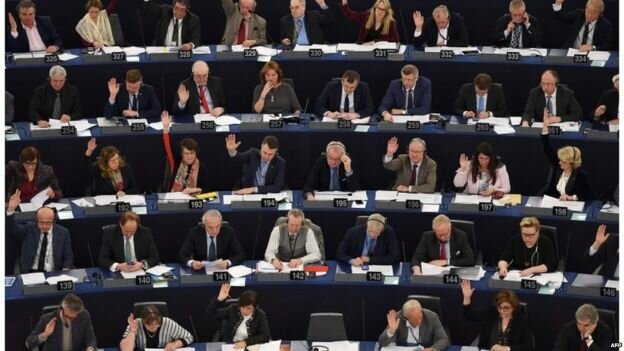Britons ‘should keep EU rights’ post-Brexit
By BBC
British citizens should be allowed to keep the benefits of EU membership, according to the chief Brexit negotiator at the European Parliament.
Guy Verhofstadt said allowing individuals to keep rights, such as freedom to travel and vote in European elections should be a priority.
The former Belgian prime minister said Brexit had been a “tragedy” and a “disaster” for people in the UK and EU.
He also warned the European Parliament had veto powers over any deal struck.
Prime Minister Theresa May wants to trigger Article 50 of the Lisbon Treaty by the end of March, which would pave the way for Brexit negotiations, in which the rights of EU nationals living in the UK and Brits living on the continent will be a key issue.
Mr Verhofstadt, who leads the liberal group of MEPs in the European Parliament, told the BBC that the matter had to be prioritised and “cannot be part of the political games” that have taken place over the last few months.
Identity lost?
He told BBC Radio 4’s Today programme he had received more than 1,000 letters from UK citizens who did not want to lose their relationship with “European civilisation”.
Mostly these were driven by emotion and a feeling that they did not want to lose their European identity post-Brexit, he said, adding that he did not understand why the negative fall out from the decision had not been discussed during the referendum, which had instead focused on the economics of Britain leaving the EU.
Many of the letters began with the appeal that “‘I’m a UK citizen – I don’t want to lose my relationship with Europe and European civilisation,'” he said.
“So emotion is now coming up and all those voters will want to remain in the European Union and have the feeling that they are lost, that nobody is defending them anymore, that they are losing a part of that identity – and it’s for that reason that I’m trying to convince the European Union, not only the European Parliament, to take on board that feeling of UK citizens.
“I think we need to examine what type of special arrangement we can make for those individual citizens who want to continue their relationship with the EU, and the opposite – it’s for both sides.”
Peace process
Mr Verhofstadt said the situation “is a crisis for the EU”. “The fact that a large country like Britain is leaving the EU…? It’s shown a crisis in the European Union – it’s a disaster. That Britain goes out of the EU is a tragedy, a disaster, a catastrophe – you name it.”
He said the responsibility now is to look for “a new partnership” between the EU and the UK, but he stressed: “Unfortunately, because of the decision taken by the UK government, it can’t be the single market – because they don’t accept the full freedom.
“It cannot be the customs union, because they want to make their own trade deals. It cannot be by the European Court of Justice – it cannot be the European economic area.”
Pressed on whether a good deal could still be reached that can work for both sides, he said: “That’s exactly what we’re going to try to do.”
‘Voted down’
Mr Verhofstadt also insisted that there could be “no hard border” between the Republic of Ireland, that will remain in the EU, and Northern Ireland, which is leaving.
“What can’t happen is that we destroy all the efforts that have been undertaken over the last 20 to 30 years to have peace there, so no hard border,” he said.
He also warned the European Parliament will have the power of veto any deal brokered between the UK and the European Commission on Brexit.
“We vote no – that is possible,” he told Today. “It has happened in a number of other cases that a big international multilateral agreement was voted down by the European Parliament after it was concluded.
“The fact that in the treaty it is stated we have to say yes or no doesn’t mean that automatically we vote yes.”
Prime Minister Theresa May has indicated that the UK Parliament will vote on the terms of exit before the European Parliament but that the UK will leave the EU anyway, irrespective of whether MPs approve or reject them.





